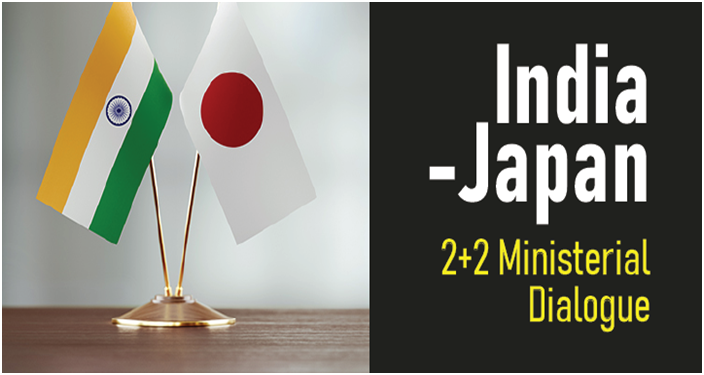India-Japan 2+2 Ministerial Dialogue (GS Paper 2, International Relation)

Why in news?
- The second India-Japan 2+2 Ministerial Dialogue held in Tokyo recently.
- India’s Defence Minister and External Affairs Minister meet their Japanese counterparts for an in-depth discussion on all critical challenges to a rules-based global order that increasingly binds the two countries, and provides renewed vigour to their special strategic and global partnership.
Why this meet was crucial?
- The meeting took place against the backdrop of heightened tensions across the Taiwan Strait during which China lobbed five missiles in Japan’s exclusive economic zone.
- The 2+2 dialogue also coincided with North Korea passing a new law declaring its irreversible status as a nuclear weapons state.
- This, together with growing Chinese belligerence and its expanding nuclear arsenal, erodes Japan’s security and provides the raison d’être for paragraph 5 of the India-Japan Joint Statement.
Japan reinforcing defence capabilities:
- It is striking in terms of the resolve expressed by the Japanese side to fundamentally reinforce Japan’s defence capabilities within the next five years.
- The development of so-called “counterstrike capabilities” and a substantial increase in the defence budget (reportedly to two per cent of the GDP) find specific mention.
- Clearly, Japan is freeing itself from self-imposed shackles in order to develop robust capacities to tackle the emerging security threats from China and North Korea.
Key outcomes:
- While the Joint Statement issued by the two sides at the end of the 2+2 dialogue reiterates their commitment to a free and open Indo-Pacific, a rules-based global order that respects the sovereignty and territorial integrity and the peaceful resolution of disputes among others, there are several indications pointing to a rapid deepening of the strategic and defence partnership in recent months.
- They had a “frank and fruitful” discussion on the Indo-Pacific and Ukraine, suggesting that strategic ties between India and Japan are resilient enough to accommodate differences in approach on the war in Europe.
Military Exercises:
- A key outcome of this round of talks was the agreement to launch the Joint Service Staff talks between the Japan Joint Staff and the Indian Integrated Defence Staff.
- This is a significant step towards enhancing cooperation between the three services as well as the Coast Guard on both sides in an integrated manner, further building on existing bilateral and multilateral exercises including “Dharma Guardian” (ground forces), “JIMEX” and “Malabar” (navies), and, an earlier decision to conduct the inaugural India-Japan fighter exercise between the two air forces.
- The four ministers also welcomed the participation of Japan, for the first time, in the “MILAN” multilateral naval exercise organised by the Indian Navy.
- MILAN 2022 witnessed the first-ever participation by not just Japan but all the Quad nations, as well as France and South Korea.
- That it was held under the Eastern Naval Command for the first time instead of the Andaman and Nicobar Command points to a growing willingness on the part of India, Japan and like-minded partners to recast existing and newer forms of cooperation to meet the requirements of a nascent Indo-Pacific theatre.
Bilateral ties:
- The 2+2 dialogue in Tokyo took place in the wake of two bilateral summits between India and Japan in 2022— the visit of Japanese Prime Minister to India in March and that of Indian Prime Minister to Japan for the Quad Leaders’ Summit in May.
- Both nations are marking the 70th anniversary of the establishment of bilateral relationsin 2022 has no doubt been instrumental in re-energising ties, but the spurt is also attributable to the long-term vision shared by the leaders on both sides.
- Bilateral priorities such as the India-Japan Industrial Competitive Partnership, the Supply Chain Resilience Initiative and cooperation in clean energy are expected to show faster results as India and Japan gear up to assume the presidency of the G-20 and the G-7, respectively.
Cooperation in technology:
- Indian Defence Minister’s presence in Tokyo for the 2+2 dialogue is expected to provide thrust to cooperation in defence equipment and technology, covering areas such as Unmanned Ground Vehicles (UGV) and Robotics, where Japan has considerable strengths.
- Another area of potential cooperation is in the manufacturing of drones. Japan’s largest drone manufacturer, ACSL, has already established a joint venture in India with Delhi-based Arc Ventures.
- Earlier in March, the Manohar Parrikar Institute for Defence Studies and Analyses and Japan’s New Energy and Industrial Technology Development Organisation (NEDO) organised an event to promote cooperation in this field, drawing an enthusiastic response on both sides.
- The recently held space and cyber dialogues have also pushed bilateral cooperation into newer realms with a defence and security orientation.
Way Forward:
- The Agreement Concerning Reciprocal Provision of Supplies and Services (ACSA) between the Self-Defence Forces of Japan and the armed forces of India signed in 2020 has already been operationalised earlier this year. This paves the way for deeper cooperation between the two militaries.
India’s emergence as the fifth-largest as well as the fastest-growing economy in the world will definitely ensure a further quantum leap in strategic ties with Japan.


